The fall of Kiev and the end of resistance in the south now cleared the way for German forces to launch a major attack on Moscow: the loss of so many Soviet troops since the invasion began meant that, for the first time, Soviet forces no longer outnumbered German forces. Also this week for the first time, German U-boat submarines entered the Mediterranean; and the United States launched its first ‘Liberty Ships’, mass-produced merchant ships designed to transport supplies to Europe.
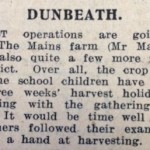 In Caithness, schools had now started their second holiday of the summer to help with the harvest; they would not go back again until 14 October. The John O’Groat Journal reported on the harvest in Dunbeath, and managed a little dig at the teachers at the same time: “Harvest operations are going well ahead. The Main farm (Mr Mackay) is cut off, also quite a few more farms in the district. Over all, the crop is very good. The school children have now got their three weeks’ harvest holidays and are helping with the gathering of the harvest. It would be time well spent if the teachers followed their example and also gave a hand at harvesting.”
In Caithness, schools had now started their second holiday of the summer to help with the harvest; they would not go back again until 14 October. The John O’Groat Journal reported on the harvest in Dunbeath, and managed a little dig at the teachers at the same time: “Harvest operations are going well ahead. The Main farm (Mr Mackay) is cut off, also quite a few more farms in the district. Over all, the crop is very good. The school children have now got their three weeks’ harvest holidays and are helping with the gathering of the harvest. It would be time well spent if the teachers followed their example and also gave a hand at harvesting.”
Unidentified objects were still being washed up on Caithness beaches. PC Kennedy of Dunbeath reported on 26 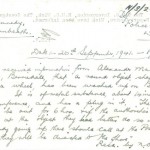 September that: “I have received information from Alexander MacDonald, joiner, Berriedale, that a round object, shaped something like a wheel, has been washed up on Berriedale shore. It is of metal substance, about 14 inches in circumference, and has a plug in it. The tide will now be out for 6 hours & if the authorities want to look at the object they had better do so in that time.”
September that: “I have received information from Alexander MacDonald, joiner, Berriedale, that a round object, shaped something like a wheel, has been washed up on Berriedale shore. It is of metal substance, about 14 inches in circumference, and has a plug in it. The tide will now be out for 6 hours & if the authorities want to look at the object they had better do so in that time.”
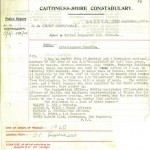 Meanwhile survivors of sunk merchant ships continued to arrive at Scrabster. The Thurso police reported on 23 September that 18 members of the crew of the SS “Bloomfield”, carrying coal to the Faroe Islands [the document says it started from “Worlsington”, which we can’t identify], had been landed at Scrabster. The report states that the ship had been “bombed and sunk by enemy action at 8 a.m. on Saturday 13th instant, when 30 miles East of Faroes”. Fortunately the entire crew were rescued.
Meanwhile survivors of sunk merchant ships continued to arrive at Scrabster. The Thurso police reported on 23 September that 18 members of the crew of the SS “Bloomfield”, carrying coal to the Faroe Islands [the document says it started from “Worlsington”, which we can’t identify], had been landed at Scrabster. The report states that the ship had been “bombed and sunk by enemy action at 8 a.m. on Saturday 13th instant, when 30 miles East of Faroes”. Fortunately the entire crew were rescued.
The John O’Groat Journal reported this week that two black swans had been seen on Wick river, some distance 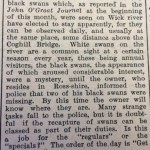 above the Coghill Bridge. The paper noted that while white swans were a common sight, the appearance of the black swans had been a mystery “until the owner, who resides in Ross-shire, informed the police that two of his black swans were missing”. Was the recapture of the swans a task for the police? “The order of the day is “Get your swan”.”
above the Coghill Bridge. The paper noted that while white swans were a common sight, the appearance of the black swans had been a mystery “until the owner, who resides in Ross-shire, informed the police that two of his black swans were missing”. Was the recapture of the swans a task for the police? “The order of the day is “Get your swan”.”
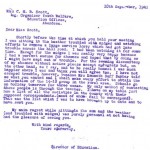 Finally, Mr McHardy, the Director of Education, wrote a disarmingly frank letter to Miss Scott, Organiser Youth Welfare, apologising for failing to attend a meeting which she had organised: “Dear Miss Scott, shortly before the time at which you held your meeting I was sitting in the heather troubled with midges and watching efforts to remove a large service lorry which had got into trouble across the hill road. I had been watching it for some time. Except for the midges I was really very happy because I had a perfect excuse for absence and hoped that by doing so I might have kept out of trouble. For the seeming discourtesy of my absence without notice please accept my request but, on the other hand, as I say, and to be really honest I was much happier where I was and think you will agree too.”
Finally, Mr McHardy, the Director of Education, wrote a disarmingly frank letter to Miss Scott, Organiser Youth Welfare, apologising for failing to attend a meeting which she had organised: “Dear Miss Scott, shortly before the time at which you held your meeting I was sitting in the heather troubled with midges and watching efforts to remove a large service lorry which had got into trouble across the hill road. I had been watching it for some time. Except for the midges I was really very happy because I had a perfect excuse for absence and hoped that by doing so I might have kept out of trouble. For the seeming discourtesy of my absence without notice please accept my request but, on the other hand, as I say, and to be really honest I was much happier where I was and think you will agree too.”
